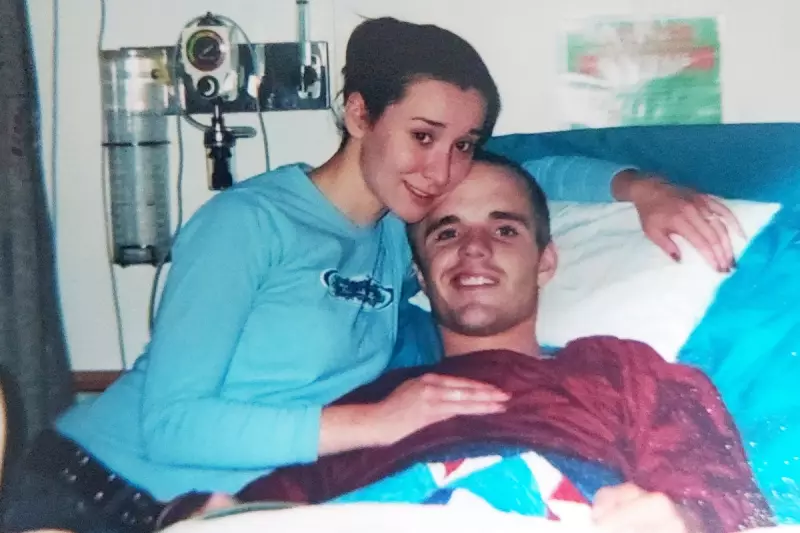
The Deadly Attack and Missed Opportunities
A former Marine sniper stands accused of carrying out a mass shooting at a crowded North Carolina waterfront bar, despite numerous warning signs about his deteriorating mental state in the months leading up to the tragedy. Nigel Max Edge, 41, allegedly guided a motorboat up to the American Fish Company bar on the Cape Fear River in Southport on September 27 and opened fire with an AR-style rifle, killing three people and wounding five others.
Friends Sounded Alarm Months Before Shooting
Marc Simmons hadn't heard from his estranged friend in nearly seven years when Edge unexpectedly appeared at his workplace in May 2025, falsely accusing Simmons of stealing his identity. The two had originally bonded over their shared experience as Marines serving in Iraq, with Simmons' children once affectionately calling Edge "Uncle Sean" - back when he still went by his original name, Sean William DeBevoise.
Simmons became so concerned about his former friend's behaviour that he filed a handwritten request for a protective order. "The defendant, Nigel Edge, is mentally unstable," Simmons wrote to the judge. "Always has a pistol on him, on high doses of medications that cause defendant to be anxious."
This warning came a full four months before the deadly shooting incident. In June, a judge officially ordered Edge to stay away from Simmons, though by then the damage had been done.
Weapons Cache and Legal Options
Following the shooting, police recovered an alarming arsenal from Edge's possessions. From his car and boat, authorities seized two handguns and a short-barreled rifle. At his home, they discovered two additional rifles and pistols, including one weapon equipped with a silencer.
The tragedy prompted Democratic Governor Josh Stein to call for North Carolina to join the 21 states that have implemented "red flag laws," which allow authorities to temporarily confiscate firearms from individuals deemed dangerous. However, there existed another legal mechanism that could have potentially prevented the violence.
North Carolina law permits anyone - not just close family members - to petition a magistrate to involuntarily commit someone to a psychiatric facility for evaluation. Mark F. Botts, an associate professor at the University of North Carolina School of Government, noted that "it seems like he was estranged from the very people that would normally intervene."
Descent Into Paranoia and Delusion
Edge's journey from decorated Marine to accused mass shooter reveals a troubling pattern of mental health deterioration. After joining the Marines straight out of high school, he rose through the ranks to join the elite recon sniper corps. His military career ended medically in 2009 after he was shot four times during his second deployment to Iraq in 2006.
Rachel Crowl, who fell in love with Edge when they were teenagers, described the man she knew after his return from Iraq. Despite having a large portion of his skull missing and an insurgent's bullet still lodged in his brain, Marine Sgt. Sean DeBevoise - as he was then known - initially seemed to maintain a firm grasp on reality.
However, disturbing changes soon emerged. Crowl reported that Edge began "patrolling the house with a rifle and sleeping with a loaded pistol under his pillow." This behaviour led to separate bedrooms, eventual estrangement, and ultimately divorce.
The last time Crowl saw him, approximately ten years ago on a Wrightsville Beach pier, she described the encounter as "heartbreaking." Edge looked her directly in the face and recounted completely fabricated stories, including allegations that she had hired his platoon to kill him and that they had been sex trafficked during high school.
Legal Onslaught and Systemic Failures
Edge's descent into paranoia manifested through an extensive campaign of litigation. In May 2025, he filed a federal lawsuit against Crowl, Simmons, an ex-girlfriend, and a former Marine from his first Iraq deployment. The lawsuit absurdly alleged they were all part of a "Civil Conspiracy" to sexually traffic and kill him, or to make him kill himself.
This was just one of many lawsuits Edge filed against friends, family members, doctors, hospitals, the Department of Veterans Affairs, and even a church. The legal barrage became so severe that a judge in Brunswick County took the unusual step of restricting Edge from filing additional lawsuits without court approval.
His own mother, Sandra DeBevoise, wrote in a legal response last December that "Plaintiff suffers from war injuries and he suffers from delusions" and post-traumatic stress disorder, adding "The VA needs to take care of him!!!" The VA declined to comment, citing medical privacy laws.
Several individuals told The Associated Press they believed they lacked standing to file a commitment petition because they weren't close relatives. Meanwhile, the state Department of Health and Human Services cautions that involuntary commitment should be "a last resort." Professor Botts summarized the situation perfectly: "A person like this just falls through the cracks."
Aftermath and Continuing Legal Battles
Edge now faces charges of first-degree murder and attempted murder and has been held in jail without bond since the September shooting. A November hearing to determine next steps in the case has been postponed until January. Prosecutors and Edge's attorney have not responded to questions about why the case was delayed.
Even from behind bars, Edge remains active in the legal system. Approximately three weeks after the shooting, he filed a handwritten notice of appeal after a federal judge dismissed his civil rights lawsuit against the FBI, U.S. Department of Justice, several local law enforcement agencies, and a veterans' charity.
On lined notebook paper, he wrote without further context: "Recent events, 'Self defense' against 'White Supremacist Pedophiles' directly related to this case."
Rachel Crowl expressed the collective guilt felt by many who knew Edge, stating "We failed him, as a whole." The tragedy highlights the critical need for better mental health support for veterans and more effective intervention mechanisms for individuals displaying clear warning signs of violence.






